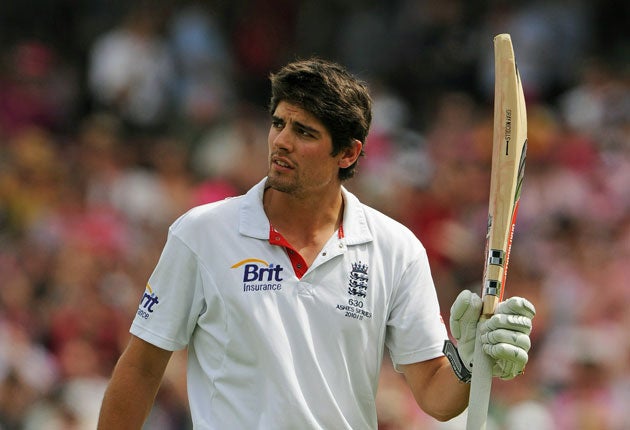Stephen Brenkley: England take a three-way leap into the unknown
Neither Cook nor Broad seems equipped for the roles they have been selected for

Not only do England have three lions, they now have three captains to match. It is a decision that could have been dreamt up in the marketing department instead of the selection room, a wizard wheeze as much as a tactical ploy: a skipper for each king of the jungle emblazoned on the sweater.
If the announcement yesterday of a trio of leaders was prompted by Andrew Strauss's decision to resign the one-day captaincy and the undoubted feeling that the erstwhile Twenty20 captain, Paul Collingwood, has reached the end of the road, it is still a huge risk for all concerned.
While Strauss chose to go, Collingwood was extremely disappointed to be relieved of his duties, no doubt partly because a year ago he led England to the World T20 Championship.
In opting for Alastair Cook, the batting hero of the Ashes, to take over the 50-over side and Stuart Broad, a first choice in all formats but with a suspect temperament, to lead the T20 side, with Strauss still master of the Test XI – perhaps they could form a specialist skiffle group – England have gone where no side has ever previously voluntarily trodden. Indeed, Strauss was appointed in January because of the need for stability.
The appointments appear to have followed an interview process involving several candidates including Kevin Pietersen, whom Strauss replaced in all three formats amid unprecedented controversy 28 months ago, and other players probably including batsman Ian Bell and fast bowler Jimmy Anderson.
The stage has not been reached where the England and Wales Cricket Board places an advertisement for a captain on the situations vacant section of its website but clearly the days of the selectors decreeing who should be captain from their ivory tower are gone. Still, it seems odd that a potential candidate for the captaincy of England may have been asked: "So, it's coming down to the last over of a tight one-day match with the opposition needing six, who do you bowl, Anderson or Bresnan? And do you have a slip?"
Andy Flower, the team coach, who was part of the interviewing panel, conceded that he did not know how having three captains would work out, which betrays some element of doubt. Strauss has probably taken the biggest risk. So respected is he, despite England's recent failings in the World Cup, that he could certainly have continued. But his ruminations following the longest winter have led him to conclude that he needs all his energies for Test cricket.
He leaves himself exposed. For all the highfalutin' talk of rotation and specialists, England continue to find, like all sides, that their best players are their best players in most formats. That meant eight of the side beaten by Sri Lanka in the World Cup quarter-finals last month had also been part of the Ashes-winning campaign earlier in the winter, as were five of those who won the World T20.
The same players, to a large extent, will be listening to three different captains, espousing different theories of captaincy on and off the field. While the hope is that both Cook and Broad will learn from the wisdom of Strauss, there is no question that each will bring different characteristics to bear on the dressing room, and who knows what effect that might have?
England may be attempting to draw a new template for international cricket. Different captains may provoke a constant stream of fresh ideas in a sport where so many differently nuanced skills are expected of players for months at a time. In which case, England may have chosen differently.
Perhaps the starkest aspect of the appointments is that they appear to have been made with the Test captaincy in mind. Cook, the batting hero of the Ashes campaign last winter, has played only 26 of England's 118 one-day matches since he made his limited-overs debut in June 2006 and only three since November 2008, when he led the side to Bangladesh in Strauss's absence last year.
These figures attest to the belief among selectors that he does not have quite what it takes as a one-day cricketer. Though he has changed considerably and can go at a fair lick with a bludgeoning square cut and drive and a walloping slog sweep, his range of shot is not wholly convincing. Broad is much more expressive, has been positively ill-tempered in too many exchanges and so far has not had the chance to demonstrate leadership qualities.
But neither seems obviously equipped for the roles they have been selected for. The interviewing panel may like to assume that in Cook they have chosen a like-for-like replacement for Strauss, a solid left-handed opener on whom more flamboyant characters can depend. But, for all Cook's impressive attributes, it would have been bolder to pick a more obviously accomplished one-day player, even a specialist unfettered by concerns in other parts of the game.
Broad will not have many games in which to lead before England have to defend their World T20 in Sri Lanka next year. But it is hard for a fast bowler to captain in any form of cricket – which is why so few do it at Test level – and in T20, where so much is happening so quickly, it may be harder still. As it is, both appointments look like an audition for the Test captaincy, which may easily now come up sooner rather than later.
Subscribe to Independent Premium to bookmark this article
Want to bookmark your favourite articles and stories to read or reference later? Start your Independent Premium subscription today.

Join our commenting forum
Join thought-provoking conversations, follow other Independent readers and see their replies